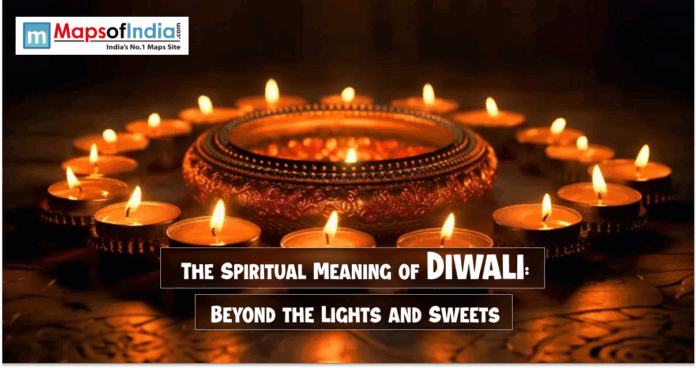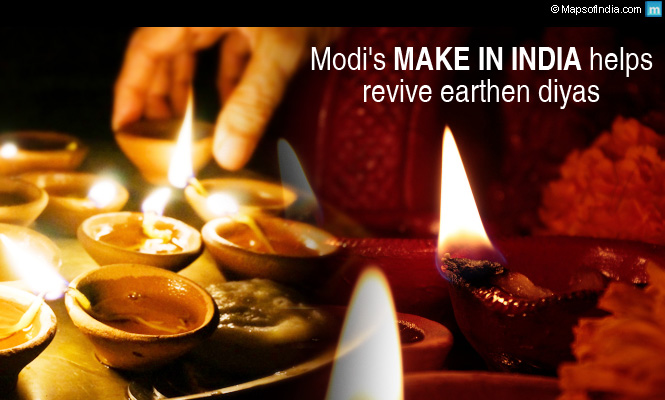Diwali, or the Festival of Lights, is one of the most popular festivals in India. It is equated with glittering lamps, colourful rangolis, holiday desserts and the happy give and take of gifts. However, behind these outward festivities lies a deeper spiritual meaning, and it has been the mainstream of the generations over centuries. Diwali has no more to do with the external ornaments or the indulgence in sweets; it is a festival that represents the eternal struggle between the light and the dark, the knowledge and the ignorance, the good and the bad.
The Triumph of Light Over Darkness
Diwali is essentially the triumph of light over darkness. This light is not a mere physical one, as the lamps and fireworks that light our houses, but it is also metaphorical. It is a symbol of enlightenment, wisdom and knowledge. When we light a diya on Diwali, we mean to rid ourselves of the darkness within- the ignorance, negativity and doubts that obscure our thoughts. Spiritual teachings prompt us to accept this inner light, be positive and shine goodness in our thoughts and actions.
In Indian culture, Diwali is also used as a celebration to mark the return of Lord Rama to the kingdom of Ayodhya, which he had left 14 years earlier and conquered the demon king Ravana. Ayodhya people lit their lamps in honour of his coming back, which means the battle of good against the bad. In a similar manner, to believers of goddess Lakshmi, the festival is the introduction of good fortune and wealth in their lives because of their devotion, discipline and purity.
A Time for Reflection and Renewal
Diwali is a process of reflection. As we clean up and adorn our houses, the tradition also calls upon us to clean up our inner selves. It is a time to look back on our ways and fix broken relationships and forget the past. Similar to how we turn on our lamps to clear the darkness in our houses, Diwali is beckoning us to clear our bad feelings and thoughts and open our hearts to love, forgiveness, and compassion.
Spiritually, Diwali promotes self-renewal and self-enhancement. At this point, people tend to start new businesses, make major financial purchases, or, at the individual level, set personal objectives. It is assumed that a beginning at Diwali is consistent with the good spirits of the universe, which improves spiritual and material health.
The Role of Goddess Lakshmi
Diwali is mainly celebrated by the goddess Lakshmi, who is the goddess of wealth and prosperity. Although her blessings are commonly regarded as great financial achievements, financial gains are not the only part of the spiritual teachings that point to wealth being not only money. It will include inner wealth – satisfaction, tranquillity, thankfulness, and the possibility of sharing happiness with people.
On Diwali, the followers light up lights, pray and meditate in order to seek her blessings. This ceremony is a reminder that we cannot just acquire material profit without spiritual and moral development. A worldly success can be balanced with inner wisdom in order to reach holistic prosperity.
The Spiritual Significance of Fireworks and Sweets
The pyrotechnics in the night sky during Diwali are not just entertainment. They are symbols of the annihilation of bad and the glorification of good. The noise and brightness of fireworks are supposed to keep the negative energies away and welcome positivity in the households and hearts.
Likewise, desserts given during Diwali have religious connotations. They symbolize love, togetherness and community. By giving gifts to family, friends, and neighbours, we strengthen our relationships, build goodwill, and also remember that happiness is multiplied when shared.
A Festival That Transcends Religion
Diwali, despite its Hindu mythological origins, has its spiritual messages that touch everybody. The motif of how light will overcome darkness, knowledge will triumph over ignorance, and virtue will surpass vice are values that are not limited by any religious boundaries. Diwali is celebrated by people of different religions and groups, and leaders understand its teachings of unity, hope, and moral courage.
Additionally, Diwali focuses on the awareness, gratitude, and solidarity of existence. It is through these principles that people learn to appreciate themselves and the world, and this aspect encourages peace internally and externally.
Conclusion
Although Diwali is brilliant in terms of visual effects and its food, its significance lies in its spiritual values. It is a celebration that invites us to cultivate our inner light, seek wisdom and develop compassion. When we adopt the spiritual meaning of Diwali, we transcend the superficial festivities and also give the festival the opportunity to bring about authentic personal and social change.
As we light diyas, as we eat festive sweets this Diwali, we must also stop to consider the inner voyage which the festival prompts. Wish that Diwali lights not only shine in our houses but also in our hearts and minds, and lead us to a good life with virtue, knowledge and endless happiness.





